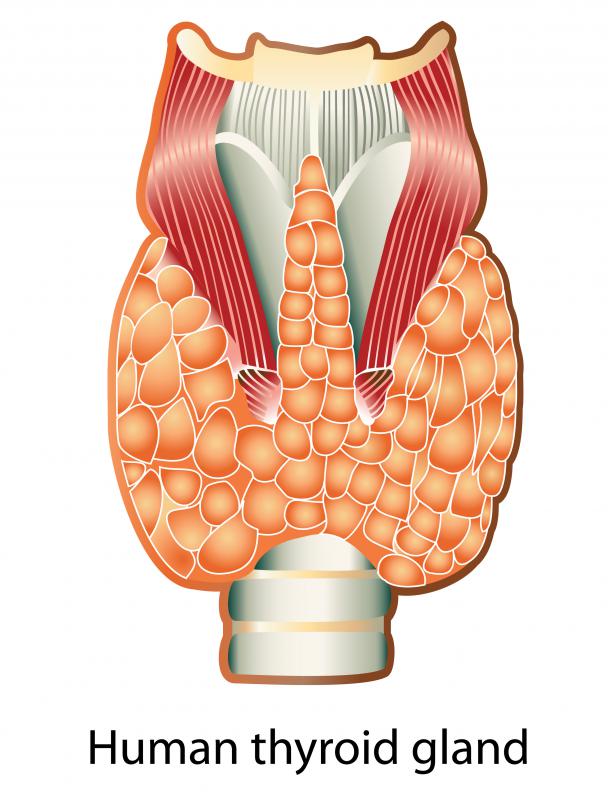At WiseGEEK, we're committed to delivering accurate, trustworthy information. Our expert-authored content is rigorously fact-checked and sourced from credible authorities. Discover how we uphold the highest standards in providing you with reliable knowledge.
What is the Connection Between the Thyroid and Menstruation?
The thyroid is a gland located in the neck that creates hormones responsible for making the metabolism function normally. The connection between the thyroid and menstruation varies, depending on whether a woman’s thyroid is working normally, working too much, or not working hard enough. If the thyroid is functioning the way it should, it will most likely have no effect on a woman’s menstruation cycle at all. An overactive thyroid, also known as "hyperactive," or an underactive thyroid, known as "hypoactive," can both lead to abnormal menstruation cycles, as well as other problems.
When a person’s thyroid is overactive, it is known as hyperthyroidism. As a result of this condition, a woman’s thyroid can produce more hormones than her body needs. Girls who have an overactive thyroid and menstruation problems may not get their period until after they are 15 years old. Women who experience this problem will normally have very irregular and very light periods.

When referring to the thyroid and menstruation, an excessive amount of thyroid hormones often means that a woman may develop amenorrhea or oligomenorrhea. The problem of amenorrhea refers to the complete absence of a menstrual cycle in a women. There are two different kinds of amenorrhea; the first is called primary amenorrhea, in which a women has never developed a period, and the other is secondary amenorrhea, where a woman’s menstrual cycle begins, but then stops occurring. Oligomenorrhea, on the other hand, is the condition of infrequent periods, diagnosed when a woman has only six to eight periods in an entire year.

Another problem that occurs because of the connection between the thyroid and menstruation is hypothyroidism. In this condition, the thyroid does not produce enough of the hormones that the body needs, so the metabolism becomes much slower. Many young girls who have this problem start their periods before the age of ten. This condition can lead to symptoms such as weight gain, fatigue, depression, and mood swings and will often lead to heavy periods and periods that occur much more often than they normally should.

Women who suffer from an underactive thyroid and menstruation problems sometimes develop a problem known as menorrhagia. With this problem, a woman’s periods can become much heavier and occur for longer periods of time. Another problem that can occur is dysmenorrhea, which causes extremely painful periods. This issue can cause very bad cramps and pain in a woman’s arms, legs, back, and head. Problems may also occur with a person's bowels because of dysmenorrhea, causing irregular bowel movements.
AS FEATURED ON:
AS FEATURED ON:
















Discussion Comments
I love what you have shared here regarding signs and symptoms of hypothyroidism. That is very helpful not only to me, but also to many people who are having problem with the condition of their thyroid.
I had extremely light and short periods when I had medication that caused hyperthyroidism.
I used to have low thyroid function and I was put on synthetic thyroid hormones to treat it. All was fine for a couple of years and then suddenly, I started getting weird symptoms. I lost five pounds in two days, my hair was falling out like I was getting chemotherapy and my periods consisted of a few spots for two days. I continued like this for three months because I was abroad and couldn't see a doctor.
When I finally saw a doctor and got blood tests, I found out that my thyroid had started functioning again and the medication had put me over the edge into hyperthyroidism. I stopped the medication and everything went back to normal.
@ddljohn-- It sounds like your thyroid dysfunction was caught early on. Had it continued longer without treatment, you would have probably had menstruation changes too.
I found out that I have hypothyroidism three months ago when suddenly I started gaining weight and feeling tired all the time. The odd part is that I didn't experience any changes in my menstruation. It was off for a few days sometimes, but it was not light or heavy and it lasted four days like usual. So I guess low thyroid function doesn't always cause menstruation changes.
Post your comments